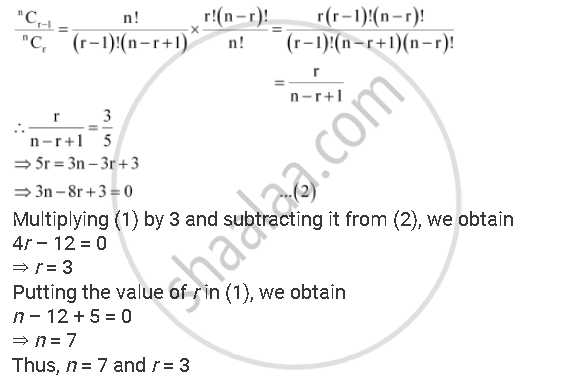Advertisements
Advertisements
प्रश्न
The coefficients of the (r – 1)th, rth and (r + 1)th terms in the expansion of (x + 1)n are in the ratio 1:3:5. Find n and r.
उत्तर


APPEARS IN
संबंधित प्रश्न
Find the middle terms in the expansions of `(x/3 + 9y)^10`
In the expansion of (1 + a)m + n, prove that coefficients of am and an are equal.
Prove that the coefficient of xn in the expansion of (1 + x)2n is twice the coefficient of xn in the expansion of (1 + x)2n–1 .
Find a positive value of m for which the coefficient of x2 in the expansion
(1 + x)m is 6
Find the middle term in the expansion of:
(iii) \[\left( x^2 - \frac{2}{x} \right)^{10}\]
Find the middle terms(s) in the expansion of:
(i) \[\left( x - \frac{1}{x} \right)^{10}\]
Find the middle terms(s) in the expansion of:
(iv) \[\left( 2x - \frac{x^2}{4} \right)^9\]
Find the middle terms(s) in the expansion of:
(vi) \[\left( \frac{x}{3} + 9y \right)^{10}\]
Find the middle terms(s) in the expansion of:
(vii) \[\left( 3 - \frac{x^3}{6} \right)^7\]
Find the middle terms(s) in the expansion of:
(ix) \[\left( \frac{p}{x} + \frac{x}{p} \right)^9\]
Find the term independent of x in the expansion of the expression:
(iv) \[\left( 3x - \frac{2}{x^2} \right)^{15}\]
Find the term independent of x in the expansion of the expression:
(ix) \[\left( \sqrt[3]{x} + \frac{1}{2 \sqrt[3]{x}} \right)^{18} , x > 0\]
If the coefficients of (2r + 1)th term and (r + 2)th term in the expansion of (1 + x)43 are equal, find r.
Prove that the term independent of x in the expansion of \[\left( x + \frac{1}{x} \right)^{2n}\] is \[\frac{1 \cdot 3 \cdot 5 . . . \left( 2n - 1 \right)}{n!} . 2^n .\]
If the coefficients of 2nd, 3rd and 4th terms in the expansion of (1 + x)n are in A.P., then find the value of n.
If in the expansion of (1 + x)n, the coefficients of three consecutive terms are 56, 70 and 56, then find n and the position of the terms of these coefficients.
If a, b, c and d in any binomial expansion be the 6th, 7th, 8th and 9th terms respectively, then prove that \[\frac{b^2 - ac}{c^2 - bd} = \frac{4a}{3c}\].
If the 6th, 7th and 8th terms in the expansion of (x + a)n are respectively 112, 7 and 1/4, find x, a, n.
Write the middle term in the expansion of `((2x^2)/3 + 3/(2x)^2)^10`.
If A and B are the sums of odd and even terms respectively in the expansion of (x + a)n, then (x + a)2n − (x − a)2n is equal to
If an the expansion of \[\left( 1 + x \right)^{15}\] , the coefficients of \[\left( 2r + 3 \right)^{th}\text{ and } \left( r - 1 \right)^{th}\] terms are equal, then the value of r is
In the expansion of \[\left( x - \frac{1}{3 x^2} \right)^9\] , the term independent of x is
If the sum of odd numbered terms and the sum of even numbered terms in the expansion of \[\left( x + a \right)^n\] are A and B respectively, then the value of \[\left( x^2 - a^2 \right)^n\] is
The number of terms with integral coefficients in the expansion of \[\left( {17}^{1/3} + {35}^{1/2} x \right)^{600}\] is
Find the middle term (terms) in the expansion of `(p/x + x/p)^9`.
Find the term independent of x in the expansion of `(3x - 2/x^2)^15`
Find n in the binomial `(root(3)(2) + 1/(root(3)(3)))^n` if the ratio of 7th term from the beginning to the 7th term from the end is `1/6`
If xp occurs in the expansion of `(x^2 + 1/x)^(2n)`, prove that its coefficient is `(2n!)/(((4n - p)/3)!((2n + p)/3)!)`
Find the term independent of x in the expansion of (1 + x + 2x3) `(3/2 x^2 - 1/(3x))^9`
The last two digits of the numbers 3400 are 01.
If the expansion of `(x - 1/x^2)^(2n)` contains a term independent of x, then n is a multiple of 2.
The number of rational terms in the binomial expansion of `(4^(1/4) + 5^(1/6))^120` is ______.
If the 4th term in the expansion of `(ax + 1/x)^n` is `5/2` then the values of a and n respectively are ______.
Let for the 9th term in the binomial expansion of (3 + 6x)n, in the increasing powers of 6x, to be the greatest for x = `3/2`, the least value of n is n0. If k is the ratio of the coefficient of x6 to the coefficient of x3, then k + n0 is equal to ______.
If the coefficient of x10 in the binomial expansion of `(sqrt(x)/5^(1/4) + sqrt(5)/x^(1/3))^60` is 5kl, where l, k ∈ N and l is coprime to 5, then k is equal to ______.
